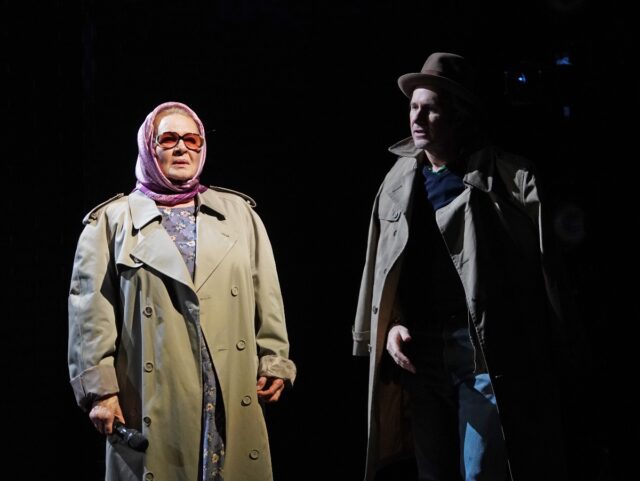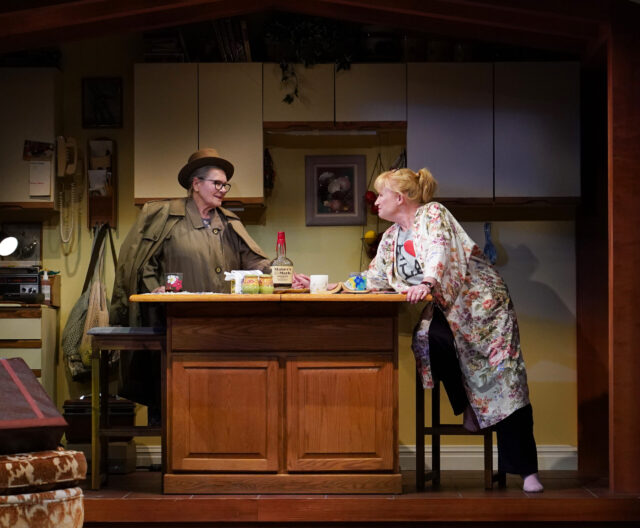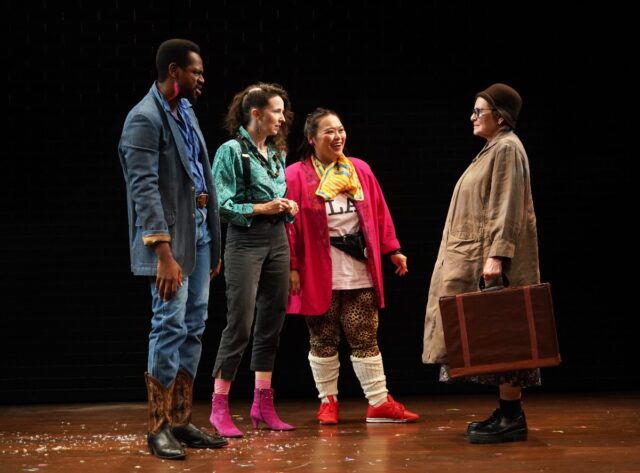
Meryl Kowalski (Dianne Wiest) is haunted by her father (Josh Hamilton) in Scene Partners (photo © Carol Rosegg)
SCENE PARTNERS
Vineyard Theatre
Gertrude and Irving Dimson Theatre
108 East 15th St. between Union Square East & Irving Pl.
Tuesday – Sunday through December 17, $37.80-$160.92
www.vineyardtheatre.org
The confusion begins with Scene Partners at the Vineyard even before the show starts. The program says it’s set in 1985, and the script explains, “And make sure it really feels that way,” but one of the songs playing over the speakers as the audience enters is the theme to Charlie’s Angels, a TV series that ran from 1976 to 1981. A confounding puzzlement continues through the entire play, where plot, dialogue, projections, screens, sound, lighting, and acting are all over the place, never coming together as a solid whole.
And that’s a shame, because it wastes a terrific performance by the wonderful Dianne Wiest, who has won two Oscars and two Emmys and has been nominated for three Drama Desk Awards. Wiest’s lilting, ethereal voice is as intoxicating as ever, but the narrative is like a poorly chopped salad put through an unbalanced spinner, a little Beckett and Pinter here, too much van Hove there, with more than a sprinkling of silly sitcom / soap opera and a dose of Joseph Beuys. It’s nearly impossible to tell what is happening in real time — what are memories, what are fantasies, what are dreams or nightmares, and what are clips from rehearsals or films.
Wiest plays Meryl Kowalski, a seventy-five-year-old woman whose husband just passed away three days ago. The first time she appears in person, not onscreen, only part of her is visible; she’s sitting in a chair, stuck in a kind of elevator shaft / dumbwaiter in the center of the back wall, and we can only see her from the neck down. She starts speaking, and there’s an uncomfortable moment when the audience tries to figure out whether they should applaud Wiest’s entrance. Not being a fan of entrance applause, I was rather content with it; plus, I loved the visual of the character trapped in the middle of nowhere.
Meryl has just come from a grief meeting and has stumbled upon a group that deals with “a bevy of emotional, physical, and mental traumas, trials, and tribulations.” The counselor (Eric Berryman) encourages her to get out of the shaft before the cables supporting her break. He says, “I encourage you to receive those snapping cables as a natural sign!” She asks, “A natural sign of what?!” He replies, “That your mass exceeds the safety-load of your pulley system!” She says, “In other words I’m fat and I don’t stand a chance.” He offers, “Not without sure footing and solid ground, which we offer in spades. Come! Join us once and for all. It only requires a minor injurious leap.”

Meryl (Dianne Wiest) seeks safe shelter with her sister (Johanna Day) in Vineyard world premiere (photo © Carol Rosegg)
Thrilled that she has a new lease on life, Meryl tells her daughter, Flora (Kristen Sieh), that her father “was a monster who ruined our lives. But now with that motherfucker dead and gone, I’m free, I’m finally free!” She explains that she is going to Hollywood to become a movie star, a goal that her husband failed at. A grown woman without a job and on drugs, Flora doesn’t want her mother to go, mostly because she needs her to take care of her. “You’ll play nothing but diaper-shitters, you hear me? Retirement-home background work!” Flora cries out. Meryl boldly replies, “I will play queens and matriarchs. Lawyers and judges, powerful women with pockets full of benzedrine pills and deep dark secrets to boot.”
On her Hollywood journey seeking fame and fortune, Meryl meets a Marxist train conductor (Berryman) who might be the ghost of her dead husband; pulls a gun on high-powered agent Herman Wassermann (Josh Hamilton); joins an acting class taught by Australian director Hugo Lockerby (Hamilton), with snarky wannabe actors Cassie (Carmen M. Herlihy), Pauline (Sieh), Maxine (Sieh), and Chuck (Berryman), who tell Meryl that she must change her name, which she doesn’t want to do because she is finally establishing her own identity, even if it will be by portraying other people; visits Dr. Noah Drake (Berryman), who may or may not be the doctor from General Hospital; is haunted by her father, who appears as a floating hat and trench coat; and reconnects with her sister, Charlize (Johanna Day), whom she hasn’t seen in ten years and who was unable to make it as an actress herself. “I’m happy with life now. I volunteer, I sing at this little dive,” Charlize says. “I don’t miss the rejection. The constant judgment. There’s no harm in being ordinary.”
But Meryl is not about to give up on this second chance at life.

Eric Berryman, Kristen Sieh, and Carmen M. Herlihy play multiple characters in Dianne Wiest–led Scene Partners (photo © Carol Rosegg)
Wiest (Rasheeda Speaking, Happy Days) is marvelous as Meryl, a dreamer with an infectious smile and a tenuous grasp of reality. You can’t help but root for her, no matter how high the barriers are to her potential success. Two-time Tony nominee and Obie winner Day (Sweat, Des Moines) is in her usual excellent form as Charlize, who has come to grips with who she is and now wants to help her sister. Berryman (Primary Trust, Toni Stone), Hamilton (The Antipodes, Dead Accounts), Herlihy (Mrs. Murray’s Menagerie, A Delicate Balance), and Sieh (Dr. Ride’s American Beach House, The Band’s Visit) are all fine in multiple roles, although the merry-go-round of characters can get bewildering, even with set designer Riccardo Hernández’s costumes, which end up battling against David Bengali’s video and projections.
Tony-winning director Rachel Chavkin, who has successfully steered such shows as Hadestown, Small Mouth Sounds, and Natasha, Pierre & the Great Comet of 1812, can’t seem to find her way into John J. Caswell Jr.’s (Wet Brain) meandering narrative, throwing too much at the wall, with not enough sticking. Every time I found myself just about ready to accept what was happening onstage, the presentation veered off track yet again.
I did, however, appreciate the music in the play, which includes Steve Perry’s “Oh Sherrie,” Corey Hart’s “Never Surrender,” and Talking Heads’ “Road to Nowhere,” the last of which ends up being a metaphor for the play.
[Mark Rifkin is a Brooklyn-born, Manhattan-based writer and editor; you can follow him on Substack here.]